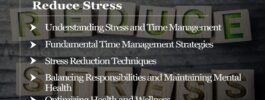Introduction
In today’s fast-paced world, many of us struggle with the constant demands of work, family, and personal commitments. It’s easy to feel overwhelmed and burnt out when juggling multiple responsibilities. However, with proper time management techniques, it is possible to avoid burnout and maintain a healthy work-life balance.
Understanding Burnout
Burnout is a state of emotional, physical, and mental exhaustion caused by excessive and prolonged stress. It can lead to feelings of cynicism, detachment, and a sense of ineffectiveness. Burnout can affect anyone, regardless of their profession or background. Recognizing the signs of burnout is the first step in addressing the issue and preventing it from escalating.
The Importance of Time Management
Effective time management is crucial in preventing burnout. By prioritizing tasks, setting realistic goals, and establishing boundaries, individuals can create a sense of control over their workload. Time management allows individuals to allocate time for work, relaxation, and self-care, reducing the risk of burnout.
Identifying Priorities
One of the key aspects of time management is identifying priorities. By determining which tasks are most important and urgent, individuals can focus their energy on activities that align with their goals and values. This helps prevent feelings of overwhelm and ensures that time is spent on tasks that truly matter.
Creating a Schedule
Creating a schedule is essential for effective time management. By allocating specific time slots for different tasks, individuals can ensure that their day is structured and organized. Scheduling breaks and downtime is equally important, as it allows for rest and rejuvenation, reducing the risk of burnout.
Setting Realistic Goals
Setting realistic and achievable goals is key to managing time effectively. By breaking down larger tasks into smaller, manageable steps, individuals can make progress towards their objectives without feeling overwhelmed. Celebrating small victories along the way can boost motivation and prevent burnout.
Establishing Boundaries
Establishing boundaries is essential for maintaining a healthy work-life balance. Setting limits on work hours, avoiding overcommitment, and learning to say no when necessary can prevent burnout and ensure that time is allocated for personal well-being and relaxation.
Practicing Self-Care
Self-care is crucial in preventing burnout and maintaining overall well-being. Engaging in activities that promote relaxation, such as exercise, meditation, or hobbies, can help reduce stress and rejuvenate the mind and body. Prioritizing self-care is not selfish but necessary for long-term health and productivity.
Avoiding Multitasking
While multitasking may seem like an efficient way to get things done, it can actually lead to decreased productivity and increased stress. Focusing on one task at a time allows individuals to work more effectively and with greater attention to detail, ultimately reducing the risk of burnout.
Seeking Support
It’s important to remember that it’s okay to ask for help when needed. Seeking support from colleagues, friends, or professionals can provide valuable insights, advice, and encouragement. Building a strong support network can help individuals navigate challenges, reduce stress, and prevent burnout.







